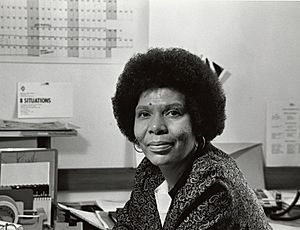Zora Martin-Felton facts for kids
Quick facts for kids
Zora Martin-Felton
|
|
|---|---|
 |
|
| Born | June 22, 1930 Allentown, Pennsylvania, U.S.
|
| Died | March 10, 2022 (aged 91) Silver Spring, Maryland, U.S.
|
| Nationality | American |
| Occupation | Museum director |
Zora Martin-Felton (born June 22, 1930 – died March 10, 2022) was an American museum leader. She helped create the education department at the Anacostia Community Museum. This museum is part of the famous Smithsonian Institution. Zora worked there as the Director of Education for many years, from 1967 to 1995.
Contents
Early Life and Learning
Zora Belle Martin was born on June 22, 1930. Her hometown was Allentown, Pennsylvania. She grew up in Bethlehem, Pennsylvania, and went to Liberty High School.
Zora went to Moravian College and earned a degree in 1952. She was the first Black student ever accepted there. Later, she earned a master's degree in education from Howard University in 1980. Zora was also an active member of Delta Sigma Theta Sorority for 67 years. In 1958, she moved to Washington, D.C. She married Edward P. Felton, Jr. in 1975.
Her Work at Museums
Zora Felton's first experience with museums was at the Southeast Neighborhood House. This was a community center in Washington, D.C. The Smithsonian Institution asked her to talk to people in the community. They wanted to see if a new museum could be created in Anacostia. This idea led to the Anacostia Museum.
Starting a Community Museum
In 1967, the Anacostia Community Museum opened. It was part of the Smithsonian Institution. This made it the first community museum in the U.S. to get money from the government. Zora Felton was hired right away to lead the Education Department. She is known for starting this important department. For almost 30 years, she was an Assistant Director at the museum.
Zora worked closely with Louise Daniel Hutchinson at the museum. She helped create many exhibits. One exhibit showed the effects of rats in Anacostia. She also helped make a nature trail and a traveling part of the museum. Zora was very involved in showing African-American history at museums.
Celebrating Juneteenth
In the early 1990s, Zora Felton helped organize Juneteenth celebrations in Anacostia. These were day-long events. This was a big step in getting more people in Washington, D.C., to recognize Juneteenth.
Zora retired from the Anacostia Museum in 1995. She became the Education Director Emeritus. This means she kept an honorary title after retiring.
Writing Books
Zora Felton wrote two books with Gail S. Lowe. Their first book, A walk through "Old" Anacostia, came out in 1976. It tells the history of the Anacostia area.
In 1993, they published A different drummer: John Kinard and the Anacostia Museum. This book is about John Kinard. He was the first director of the Anacostia Community Museum. He was also the first African American director of a Smithsonian museum. The book also tells the story of the early Anacostia Museum. It shows how the museum helped the community around it.
Awards and Honors
Zora Felton received many awards for her work.
- In 1980, Howard University honored her. They recognized her great contributions to the Black community.
- In June 1988, Dollars & Sense magazine named her one of America's Top 100 Black Business and Professional Women.
- In 1991, she received the EdCom Award for Excellence in Practice. This award came from the American Alliance of Museums.
- Zora was listed for many years in Who's Who Among Black Americans.
- She also won the Katherine Coffee Award.
- In 2009, the NAACP held a special dinner for Zora Felton. They honored her and Constance Roberts Gates for being important "firsts" in education.
Later Life
Zora Felton passed away on March 10, 2022. She was 91 years old. She left behind three children and 14 grandchildren.
 | James B. Knighten |
 | Azellia White |
 | Willa Brown |

